Medical Tourism Blog
Medical Tourism in Korea: Patient Rights & How to Raise a Dispute (For International Patients)

Table of contents
- Your Legal Rights as a Patient in Korea
- Prevention first (before treatment)
- If something goes wrong: the escalation ladder
- What to include in a dispute file
- Choosing a remedy: what to ask for
- Practical Tips for Patients
- Useful contacts (save these)
- Frequently asked questions
- Final word
Considering treatment in Korea? Everything you need to know e.g. — how to avoid scams, visas, interpreters, recovery tips — in our Medical Tourism Master Guide. Plan with confidence in minutes, not weeks!
For international patients receiving medical care in Korea. This is a practical, step‑by‑step playbook—not legal advice.
When receiving medical treatment in Korea, international patients are protected by the same laws that apply to Korean citizens. Understanding your rights and knowing where to seek help can make your medical journey safer and more transparent. In this guide, we’ll cover your core patient rights, how to prevent problems before treatment, and exactly what to do if something goes wrong—from raising a clear written complaint to escalating through official dispute channels.
Your Legal Rights as a Patient in Korea
Foreign patients have the same protections as Korean locals. This section translates the rules into plain English—informed consent, transparent pricing, registered/safe providers, and access to your medical records—and explains what each right should look like in real life at a clinic.
- Right to informed consent: Doctors must explain the procedure, risks, alternatives, recovery, and costs; you sign consent before treatment.
- Right to transparent pricing: You’re entitled to an itemized estimate and clear refund/cancellation terms.
- Right to safety & lawful providers: Clinics that attract/serve foreign patients must be officially registered to do so.
- Right to medical records: You can request copies of your medical records (ask for English if you need it; fees may apply).
- Right to privacy/confidentiality: Your health information and images should not be disclosed or used in marketing without your explicit permission.
Tip: Ask to have the operating surgeon’s name on your consent and the device/implant brands + lot/serial numbers recorded in your chart.
Prevention first (before treatment)
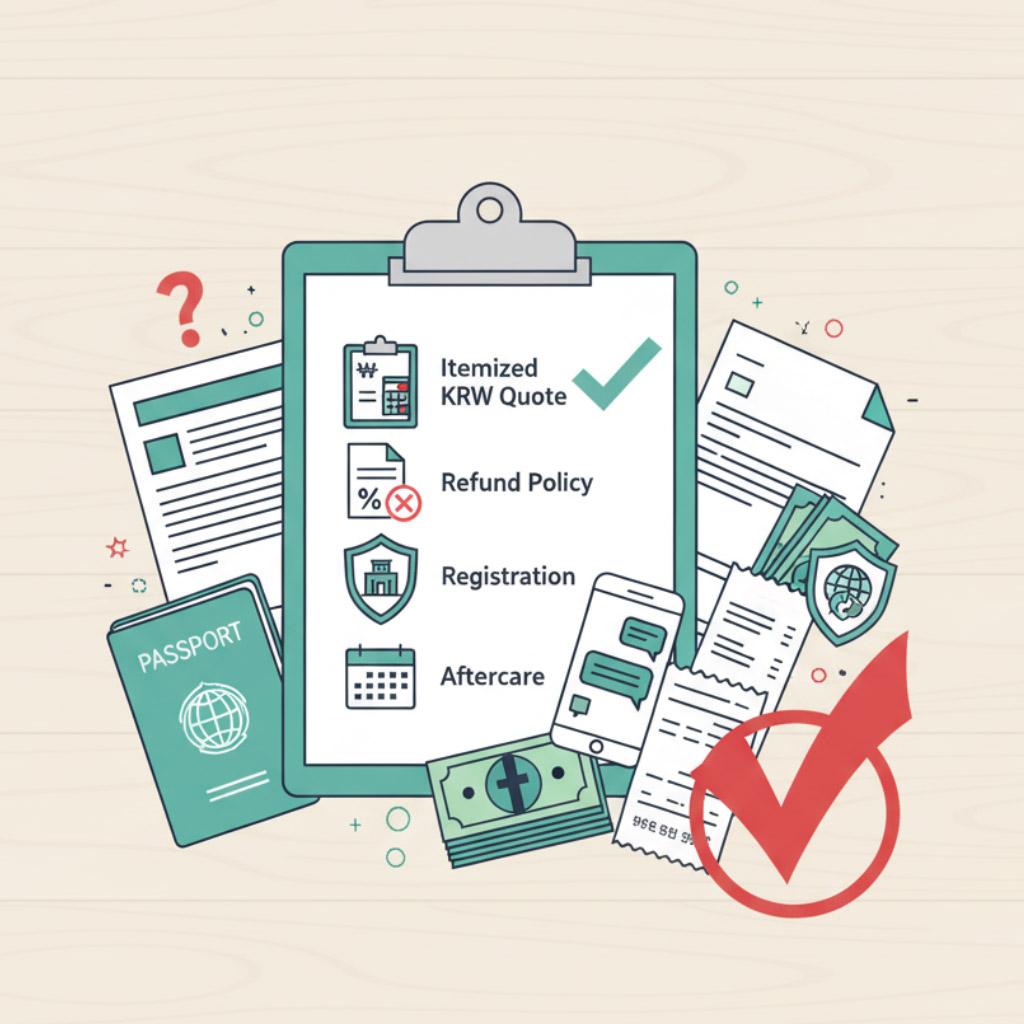
The best dispute is the one you never need. Before anything goes wrong, lock down the basics: get itemized estimates, confirm refund/cancellation terms, verify the clinic’s registration to treat foreign patients, and make sure you’ll receive English documents and aftercare. Solid prep prevents misunderstandings and gives you leverage if you ever need to complain.
- Get it in writing: itemized KRW quote, refund/cancellation policy, aftercare schedule, emergency contact.
- Verify registration: Ask for the clinic’s registration number to treat foreign patients.
- Keep records: save PDFs of quotes, consents, invoices, chats, and call summaries.
- Confirm language support: request English versions of consent/aftercare; ask for an interpreter if needed.
Before Choosing a Clinic: Best Clinic Checklist or What to Send & Ask in Your Online Consultation
If something goes wrong: the escalation ladder
Even careful patients can face delays, miscommunication, billing issues, or medical concerns. Use this step-by-step path to resolve problems efficiently—start with the clinic, then involve your agency if you used one, and escalate to official bodies only if needed.
Step 0 — Gather evidence (same day)
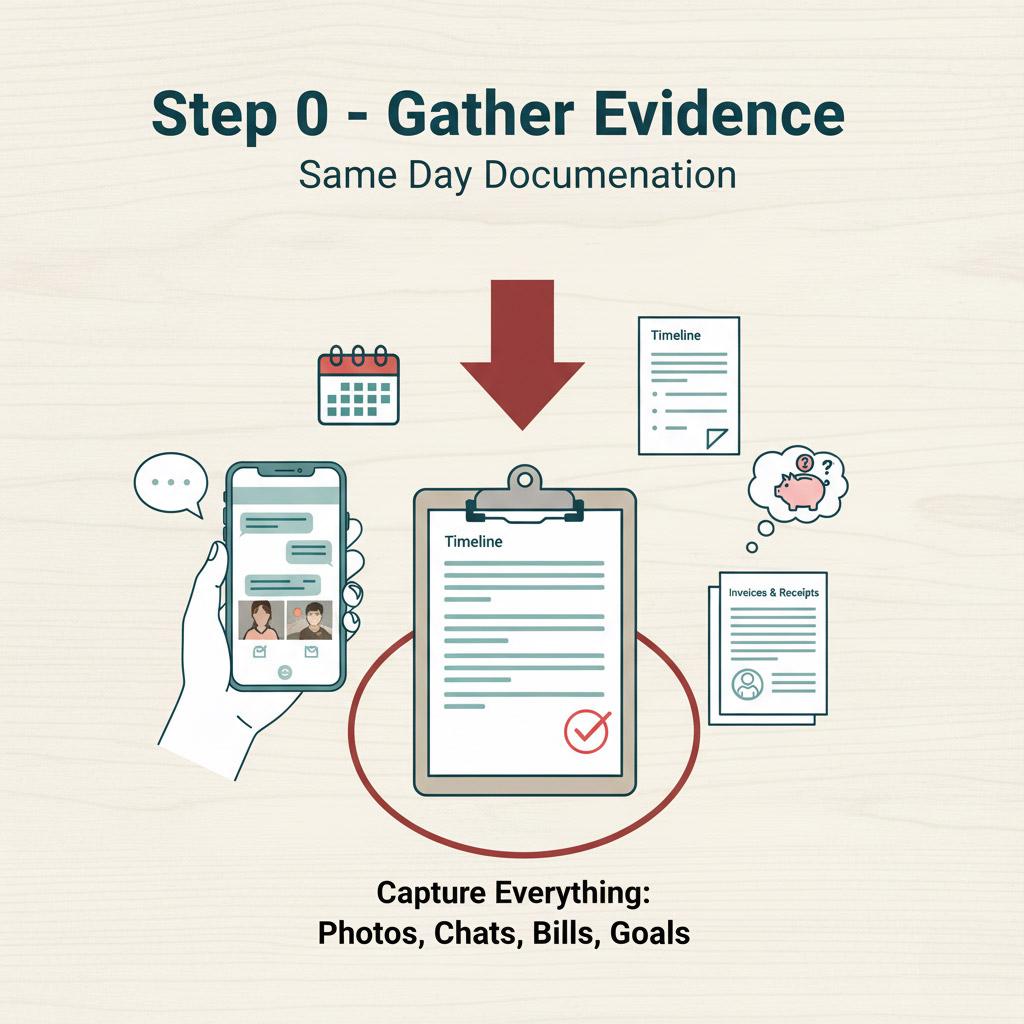
Details fade quickly. Capture everything the same day: a short timeline, screenshots of chats and emails, photos, invoices, and your goals (refund, revision, records). Good documentation speeds up fair resolutions.
- Timeline of events, who said what, and when.
- Photos, screenshots (messengers, DMs), emails, bills/receipts, medical notes.
- Your goals: refund? revision? medical evaluation? apology?
Step 1 — Resolve with the clinic (24–72 hours)
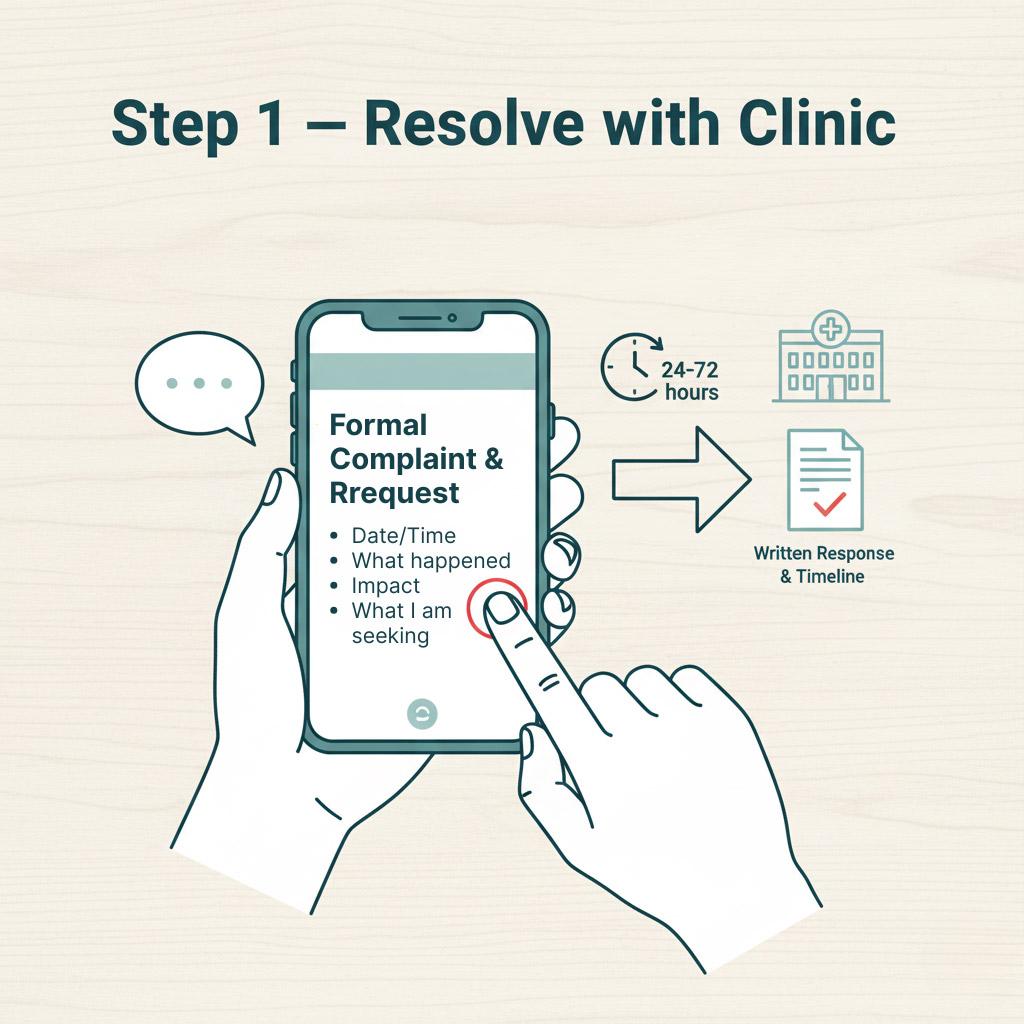
Most issues are fixed fastest at the source. A polite, structured, time-boxed email gives the clinic a fair chance to respond, creates a written record, and often unlocks quick solutions without escalation.
- Send a polite, structured email to your coordinator/doctor.
- Ask for a written response and a resolution timeline.
Clinic complaint email (copy‑paste)
Subject: Formal complaint & resolution request — [Name], [Procedure], [Procedure Date] 제목: 시술 불만 및 해결 요청 — [성함], [시술명], [시술일]
Hello [Coordinator/Dr. ____], 안녕하세요, [코디네이터/의사 성함]님.
I’m writing to formally request resolution regarding [issue]. A brief summary is below: [문제]에 관해 정식으로 해결을 요청드립니다. 요약은 아래와 같습니다:
- Date/time of procedure or visit: [YYYY-MM-DD, HH:MM (KST), clinic/branch if relevant] • 시술/내원 일시: [YYYY-MM-DD, HH:MM (KST), 필요한 경우 지점/진료실]
- What happened — promised vs. delivered: [what was agreed vs. what occurred; key deviations] • 발생한 일 — 약속된 내용과 실제 제공 내용: [사전 안내·약속 vs. 실제 진행; 주요 차이]
- Impact: [pain/complication/cost/itinerary changes/other impacts] • 영향: [통증/합병증/비용/일정 변경/기타 영향]
- What I’m seeking: [refund amount or %, revision consult, medical records, etc.] • 요청 사항: [환불 금액 또는 %, 재시술(교정) 상담, 의무기록 사본 제공 등]
Attachments: [photos, estimate/quote, consent form, receipts, chat logs]. 첨부: [사진, 견적서/비용 안내서, 동의서, 영수증, 채팅 내역].
Please confirm receipt and respond in writing by [KST date/time]. 본 메일 수신 확인 후 [한국시간(KST) 날짜/시간] 까지 서면으로 회신 부탁드립니다.
Best regards, 감사합니다.
[Your Name] | [Passport No. or DoB] | [Phone] / [Email] [성함] | [여권번호 또는 생년월일] | [전화] / [이메일]
[Booking Ref/Chart No., if any] [예약번호/차트번호(있다면)]
If you used an agency: loop them in here; they can often fix issues fast.
Step 2 — Ask your agency to intervene (same week)
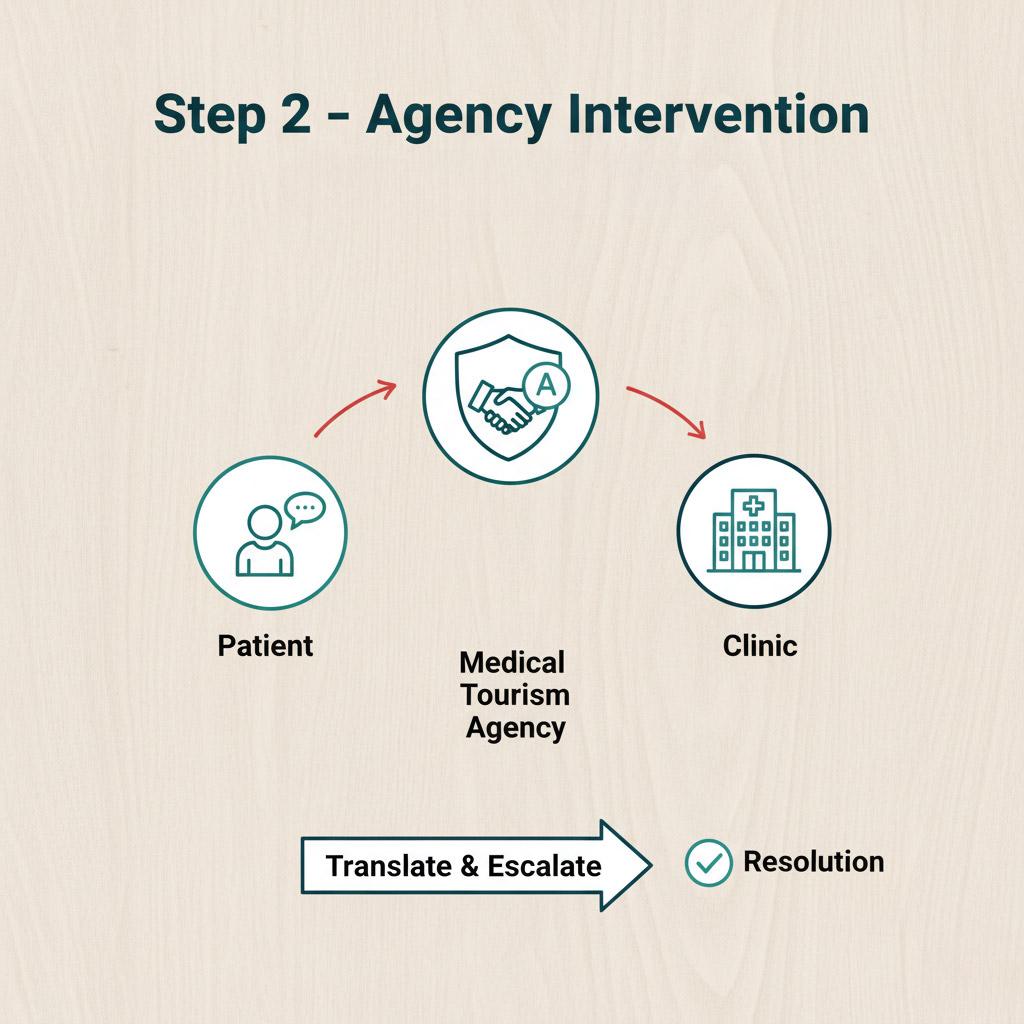
Agencies can translate, reach decision-makers, and coordinate timelines. If you booked through an accredited facilitator, loop them in—they often resolve issues faster and with less stress.
- If you booked via a registered medical tourism agency/facilitator, ask them to coordinate a solution, translate, and escalate with the clinic leadership. [Agency vs. Contacting Clinics Directly]
Step 3 — Get official help (if unresolved)
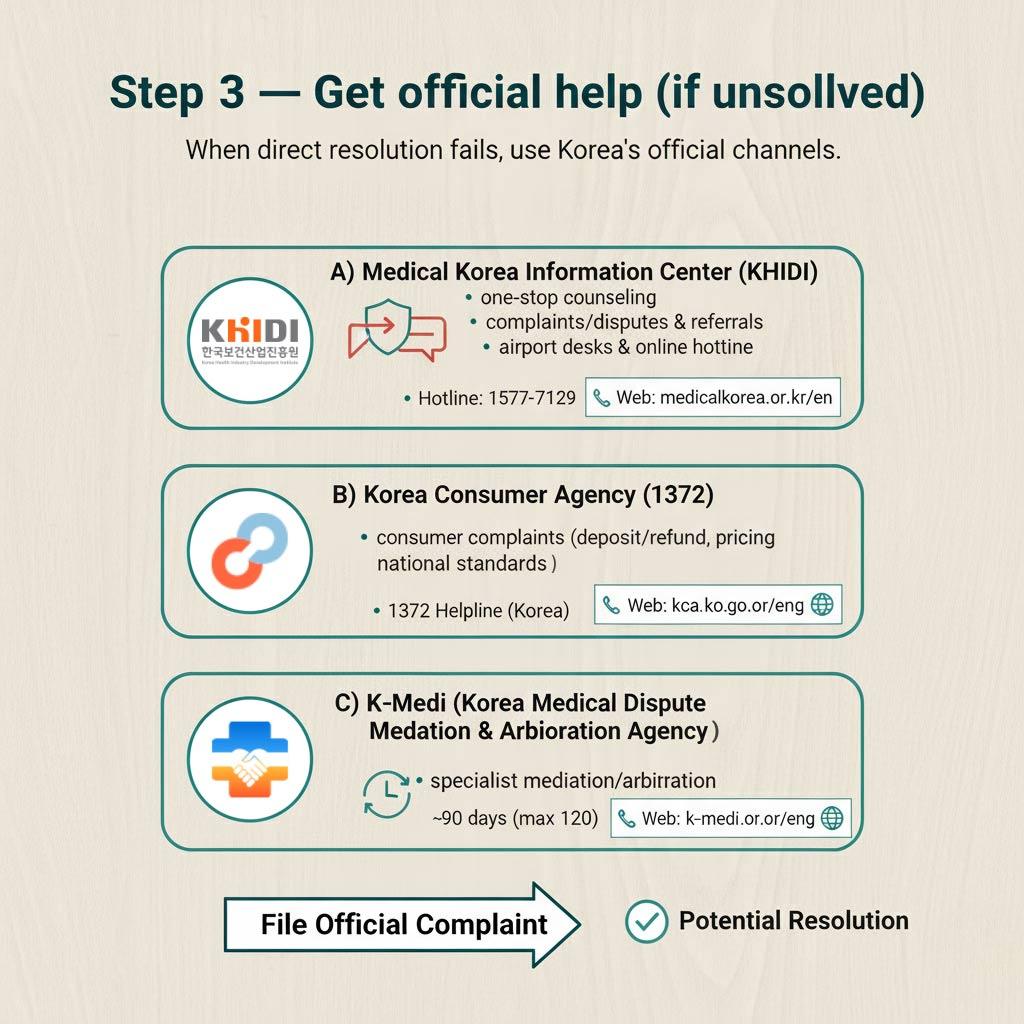
When direct resolution fails, use Korea’s official channels.
A) Medical Korea Information Center (KHIDI)
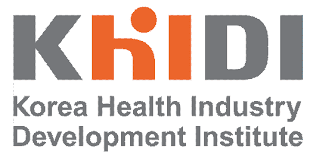
- What they do: one‑stop counseling for foreign patients; guidance on complaints/medical disputes and help with referrals to K‑Medi.
- Where: airport desks and online hotline.
- What to send: summary, clinic details, documents, and what outcome you want.
- Hotline (KR): 15777‑129 | Web: Visit the Website
B) Korea Consumer Agency (1372) — deposits, refunds, unfair terms

- What they do: receive consumer complaints (e.g., deposit/refund, pricing, misleading terms) and help apply national standards when clinic policies are stricter.
- How: call 1372 inside Korea or use the English portal; attach your contract, receipts, and written policy.
- 1372 Consumer Helpline (inside Korea) | Web: Visit the Website
C) K‑Medi (Korea Medical Dispute Mediation & Arbitration Agency) — medical accidents/complications

- What they do: specialist mediation/arbitration for medical disputes; aims to resolve within ~90 days (extendable to ~120).
- How: file a mediation request (you can start with a counseling call); provide medical records, chronology, photos. Mediation may include neutral expert review.
- Counseling: 1670‑2545 | Web: Visit the Website
What to include in a dispute file
- Identity & itinerary: passport, flight/hotel.
- Clinic packet: estimates, consent, invoices/receipts, aftercare plan, surgeon name.
- Medical evidence: records, labs, imaging, implant stickers/lot numbers.
- Communication: emails, DMs, messenger logs, date‑stamped screenshots.
- Financial proof: bank/card statements, wire SWIFT receipts.
- Your statement: 1–2 pages summarizing facts, harm, and desired resolution.
Choosing a remedy: what to ask for
- Refund (full/partial; cite written policy and consumer standards).
- Revision (same clinic or independent consult first).
- Corrective aftercare (drugs, dressings, suture removal, wound checks).
- Independent medical opinion (attach report if available).
Practical Tips for Patients
- Always keep written contracts, estimates, and receipts.
- Request English versions of consent forms and aftercare instructions.
- If a dispute arises, contact your agency or medical coordinator first—they may resolve it directly with the clinic.
- For unresolved cases, reach out to KHIDI, the Korea Consumer Agency, or K-Medi.
Useful contacts (save these)
-
Medical Korea Information Center — guidance, dispute counseling, referral to K‑Medi
Hotline (KR): 15777‑129 | Web: medicalkorea.or.kr
-
Korea Consumer Agency (KCA) — 1372 Consumer Helpline (inside Korea) | Web: kca.go.kr/eng
-
K‑Medi — Korea Medical Dispute Mediation & Arbitration Agency
Counseling: 1670‑2545 | Web: k‑medi.or.kr/eng
-
Immigration Contact Center (visa/status): 1345 (in Korea) | +82‑1345 (from abroad)
Frequently asked questions
Q. Can I get English records?
A. Yes—request translated discharge summary/operative note, medication list, and any device stickers/lot numbers. Fees may apply.
Q. What if the clinic’s refund policy is stricter than national guidance?
A. File with Korea Consumer Agency (1372); they consider the national dispute‑resolution standards when contracts are unfair or unclear.
Q. How fast is K‑Medi?
A. The target is ~90 days to resolve (can extend to ~120) once mediation starts; complex cases can take longer.
Q. Does my agency help?
A. If you booked through an accredited agency, they should assist with translation, documents, and escalation.
Final word
Start simple: write to the clinic with a clear, time‑boxed request. If that fails, use your agency, then the official channels above. Keep your documents tidy, your tone factual, and your timelines specific. Most disputes resolve when patients bring the right facts to the right place.







